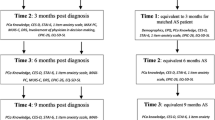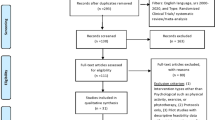Abstract
Aim
The objective of this paper was to discuss the psychological impact of active surveillance (AS) for prostate cancer (PCa) and the resulting implications of psychological wellbeing for treatment decision making and acceptance of AS protocols.
Method
Qualitative and quantitative research in the area of anxiety, depression, and distress is discussed drawing from PCa literature as well other health conditions from which parallels can be drawn.
Results
Attention is given to the role of the clinician in treatment decision making, including the value of information provision, and perceived trust in the AS as a management approach.
Conclusion
Given that research is conflicted regarding the psychological impact of AS for PCa, it is suggested that focus shifts away from debate of the ‘true’ experience of AS rather researchers and clinicians should seek to identify the factors associated with positive and negative psychological response to diagnosis and AS to improve psychological and physical outcomes. Recommendations for clinical practice are discussed.
Similar content being viewed by others
References
National Institute for Clinical Excellence N: Prostate cancer: diagnosis and management NICE guideline [NG131]. . https://www.nice.org.uk/guidance/ng131 (2019). Accessed 24 Sept 2020
National Institute for Clinical Excellence N: Prostate cancer: diagnosis and treatment (CG175). http://www.nice.org.uk/guidance/CG175 (2014). Accessed 24 Sept 2020
Culp MB, Soerjomataram I, Efstathiou JA, Bray F, Jemal A (2020) Recent global patterns in prostate cancer incidence and mortality rates. Eur Urol 77(1):38–52
Hamdy FC, Donovan JL, Lane J, Mason M, Metcalfe C, Holding P et al (2016) 10-year outcomes after monitoring, surgery, or radiotherapy for localized prostate cancer. N Engl J Med 375:1415–1424
McIntosh M, Opozda MJ, Evans H, Finlay A, Galvão DA, Chambers SK et al (2019) A systematic review of the unmet supportive care needs of men on active surveillance for prostate cancer. Psycho-oncology 28(12):2307–2322
Bailey DE Jr, Wallace M, Mishel MH (2007) Watching, waiting and uncertainty in prostate cancer. J Clin Nurs 16(4):734–741
Hedestig O, Sandman P-O, Widmark A (2003) Living with untreated localized prostate cancer: a qualitative analysis of patient narratives. Cancer Nurs 26(1):55–60
Kazer MW (2012) Conversion from active surveillance to active treatment for prostate cancer: a qualitative analysis. J Nurs Educ Pract 2(2):80
Partridge A, Adloff K, Blood E, Dees EC, Kaelin C, Golshan M et al (2008) Risk perceptions and psychosocial outcomes of women with ductal carcinoma in situ: longitudinal results from a cohort study. J Natl Cancer Inst 100(4):243–251
D’Agostino TA, Shuk E, Maloney EK, Zeuren R, Tuttle RM, Bylund CL (2018) Treatment decision making in early-stage papillary thyroid cancer. Psycho-oncology 27(1):61–68
McShane CM, Murphy B, Lim KH, Anderson LA (2018) Monoclonal gammopathy of undetermined significance as viewed by haematology healthcare professionals. Eur J Haematol 100(1):20–26
Ruane-McAteer E, Porter S, O’Sullivan JM, Santin O, Prue G (2017) Active surveillance for favorable-risk prostate cancer: Is there a greater psychological impact than previously thought? A systematic, mixed studies literature review. Psycho-oncology 26(10):1411–1421
Kinsella N, Stattin P, Cahill D, Brown C, Bill-Axelson A, Bratt O et al (2018) Factors influencing men’s choice of and adherence to active surveillance for low-risk prostate cancer: a mixed-method systematic review. Eur Urol 74(3):261–280
van den Bergh RC, Essink-Bot ML, Roobol MJ, Wolters T, Schröder FH, Bangma CH et al (2009) Anxiety and distress during active surveillance for early prostate cancer. Cancer Interdiscip Int J Am Cancer Soc 115(17):3868–3878
Chapple A, Ziebland S (2002) Prostate cancer: embodied experience and perceptions of masculinity. Soc Health Illn 24(6):820–841
Davison BJ, Breckon E (2012) Factors influencing treatment decision making and information preferences of prostate cancer patients on active surveillance. Patient Educ Couns 87(3):369–374
Ruane-McAteer E, Porter S, O’Sullivan J, Dempster M, Prue G (2019) Investigating the psychological impact of active surveillance or active treatment in newly diagnosed favorable-risk prostate cancer patients: a 9-month longitudinal study. Psycho-oncology 28(8):1743–1752
Venderbos L, Roobol M, Bangma C, Korfage I (2015) Five-year follow-up after active surveillance or curative treatment: preliminary quality of life outcomes of men with prostate cancer. Qual Life Res springer van godewijckstraat 30, 3311 gz dordrecht, netherlands. p. 30
Couper JW, Love AW, Dunai JV, Duchesne GM, Bloch S, Costello AJ et al (2009) The psychological aftermath of prostate cancer treatment choices: a comparison of depression, anxiety and quality of life outcomes over the 12 months following diagnosis. Med J Aust 190:S86–S89
Parker PA, Davis JW, Latini DM, Baum G, Wang X, Ward JF et al (2016) Relationship between illness uncertainty, anxiety, fear of progression and quality of life in men with favourable-risk prostate cancer undergoing active surveillance. BJU Int 117(3):469–477
Seaman AT, Taylor KL, Davis K, Nepple KG, Lynch JH, Oberle AD et al (2019) Why men with a low-risk prostate cancer select and stay on active surveillance: a qualitative study. PLoS ONE 14(11):e0225134
Ruane-McAteer E, Porter S, O’Sullivan JM, Prue G (2018) A cognitive-emotional see-saw: Men’s experiences of undergoing active surveillance for prostate cancer. Psycho-oncology: Wiley 111 River st, Hoboken 07030–5774, NJ USA. p. 170
Hoffman RM, Couper MP, Zikmund-Fisher BJ, Levin CA, McNaughton-Collins M, Helitzer DL et al (2009) Prostate cancer screening decisions: results from the National Survey of Medical Decisions (DECISIONS study). Arch Intern Med 169(17):1611–1618
Donovan JL (2012) Presenting treatment options to men with clinically localized prostate cancer: the acceptability of active surveillance/monitoring. J Natl Cancer Inst Monogr 2012(45):191–196
Fowler FJ Jr, Collins MM, Albertsen PC, Zietman A, Elliott DB, Barry MJ (2000) Comparison of recommendations by urologists and radiation oncologists for treatment of clinically localized prostate cancer. JAMA 283(24):3217–3222
Hanna C, Mason M, Donovan J, Barber J (2002) Clinical oncologists favour radical radiotherapy for localized prostate cancer: a questionnaire survey. BJU Int 90(6):558–560
Mills N, Donovan JL, Wade J, Hamdy FC, Neal DE, Lane JA (2011) Exploring treatment preferences facilitated recruitment to randomized controlled trials. J Clin Epidemiol 64(10):1127–1136
Wade J, Donovan JL, Lane JA, Neal DE, Hamdy FC (2009) It’s not just what you say, it’s also how you say it: opening the ‘black box’of informed consent appointments in randomised controlled trials. Soc Sci Med 68(11):2018–2028
Ruane-McAteer E (2017) Exploring the psychological impact of active surveillance for favourable-risk prostate cancer: a mixed methods study. Queen’s University Belfast, Belfast
Funding
Not applicable.
Author information
Authors and Affiliations
Contributions
ER-M and GP contributed equally to protocol/project development, data collection and management, data analysis, and manuscript writing/editing.
Corresponding author
Ethics declarations
Conflict of interest
No conflicts of interests/competing interests to declare.
Additional information
Publisher's Note
Springer Nature remains neutral with regard to jurisdictional claims in published maps and institutional affiliations.
Rights and permissions
About this article
Cite this article
Ruane-McAteer, E., Prue, G. Psychological aspects of active surveillance. World J Urol 40, 9–13 (2022). https://doi.org/10.1007/s00345-020-03553-w
Received:
Accepted:
Published:
Issue Date:
DOI: https://doi.org/10.1007/s00345-020-03553-w




